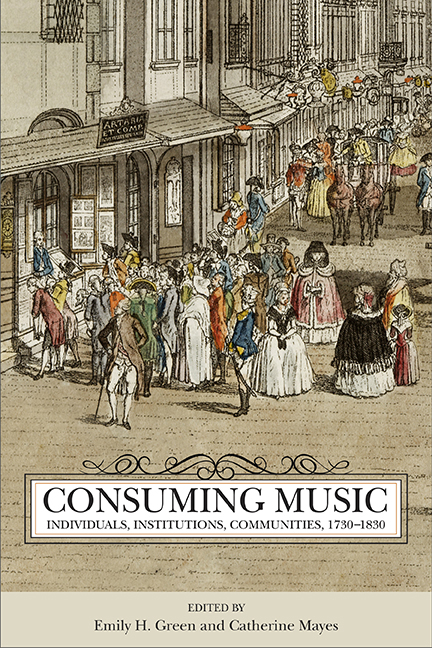Book contents
- Frontmatter
- Contents
- Acknowledgments
- Introduction
- Part One Selling Variety
- Part Two Edifying Readers
- 3 Morality and the “Fair-Sexing” of Telemann's Faithful Music Master
- 4 Eighteenth-Century Mediations of Music Theory: Meter, Tempo, and Affect in Print
- Part Three Marketing the Mundane
- Part Four Cultivating Communities
- List of Contributors
- Index
3 - Morality and the “Fair-Sexing” of Telemann's Faithful Music Master
from Part Two - Edifying Readers
Published online by Cambridge University Press: 26 April 2018
- Frontmatter
- Contents
- Acknowledgments
- Introduction
- Part One Selling Variety
- Part Two Edifying Readers
- 3 Morality and the “Fair-Sexing” of Telemann's Faithful Music Master
- 4 Eighteenth-Century Mediations of Music Theory: Meter, Tempo, and Affect in Print
- Part Three Marketing the Mundane
- Part Four Cultivating Communities
- List of Contributors
- Index
Summary
It was a blustery Thursday afternoon in early February 1729 as the Hamburg music lover Rudolph Burmeister finished his cup of coffee, bookmarked his place in a journal article about the advantages of educating women, and got up from his table at the coffeehouse. He walked a few blocks toward the city's center, crossed the Trostbrücke spanning the Nikolaifleet channel of the Alster River, then hurried past city hall and into the stock exchange, where a proprietor at the music stall greeted him warmly. “It just arrived,” the man said with a wink, handing Burmeister a freshly printed bifolium of music. It was the latest lesson from the Faithful Music Master: four densely engraved pages of music containing the second movement of a cello sonata, an aria recently sung to great applause at Hamburg's Gänsemarkt opera house, a passepied from a suite for violin or oboe with continuo, an Air for trumpet and continuo, a Marche and Retraite for harpsichord, and a demonstration of unusual chord progressions. It had been two weeks since the previous lesson, and Burmeister was eager to learn how the sonata and suite would continue and to discover what new works lay in store for him. He rushed home to play through the music on his violin and clavichord; later, he would compare notes with his three brothers, all of whom were equally eager pupils of the Faithful Music Master.
Something like this imaginary vignette must have played out during the 1720s in many German coffeehouses and bookshops, where periodicals of all kinds were eagerly consumed by an educated public hungry for news, advice, and enlightenment on a variety of topics. Burmeister and his brothers were in fact loyal patrons of Hamburg's leading musician, Georg Philipp Telemann, whose latest publishing venture was Germany's first journal of music. Der getreue Music-Meister, or the Faithful Music Master, was issued biweekly by the composer between November 1728 and November 1729 in twenty-five issues called “Lection” (lesson), for a total of one hundred pages of music.
- Type
- Chapter
- Information
- Consuming MusicIndividuals, Institutions, Communities, 1730–1830, pp. 65 - 101Publisher: Boydell & BrewerPrint publication year: 2017



